Latin America
Related: About this forumIn new bid for power, Guy Philippe vows to 'fix' Haiti's gangs in 90 days
Convicted of money laundering, the former senator said he now wants to start a ‘revolution’ in Haiti
BY ONZ CHÉRY
JAN. 03, 2024
Guy Philippe led the 2004 coup against Jean-Bertrand Aristide from bbc
CAP-HAITIEN — Just weeks after his release from prison in the United States and deportation to Haiti, former Senator Guy Philippe made a stop in Cap-Haitien on Haiti’s Independence Day, where he vowed to “fix” Haiti’s gang problem within 90 days. The stop is part of a tour Philippe has undertaken to build support for what he calls a new revolution.
“I said it and will say it again: In 90 days, I can fix this problem I see in the streets,” Philippe said during a press conference streamed on Unissons Nous, a local outlet.
https://haitiantimes.com/2024/01/03/guy-philippe-gang-violence-haiti/
~ ~ ~
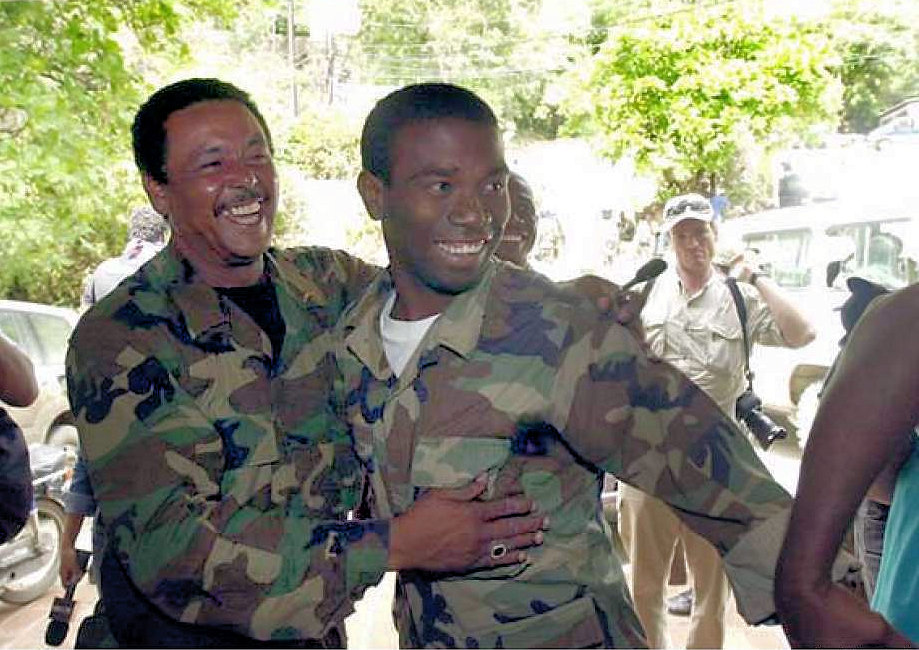

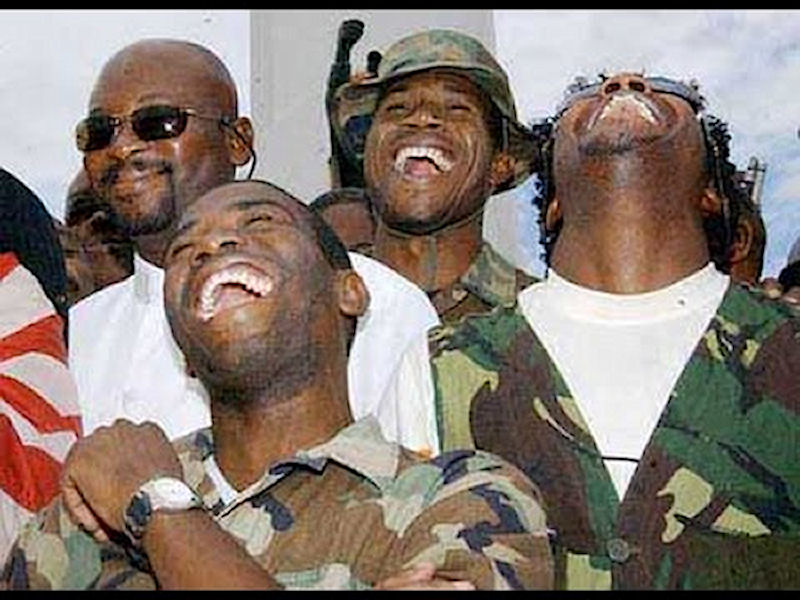

The Real Crimes of Guy Philippe
Selections from “Paramilitarism and the Assault on Democracy in Haiti” (Part 1 of 3)
Jeb Sprague -May 3, 2017213514
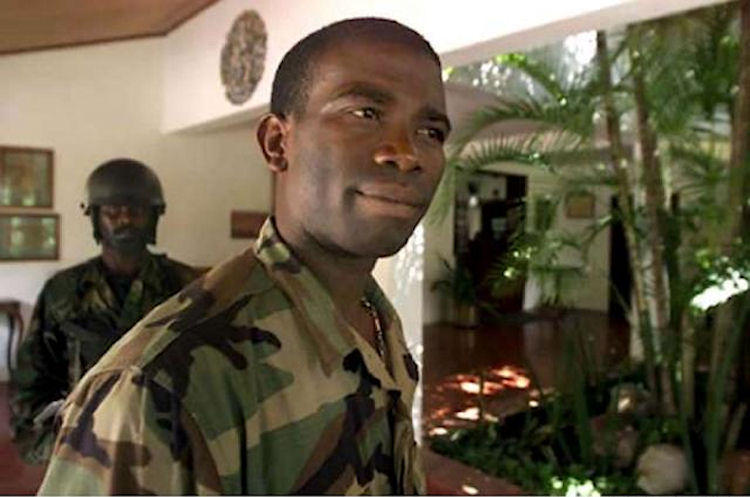
Guy Philippe, a Cap-Haïtien police chief, was the most charismatic and educated of the dissident police chiefs who formed a cabal trying to foment a coup against former President René Préval. Credit: Carlos Villalon
Former paramilitary leader Guy Philippe will be going to jail for money laundering in connection with drug trafficking. But his more serious crimes were murdering Haitians and Haitian democracy as the leader of the “armed opposition” during the Feb. 29, 2004 coup d’état against former President Jean-Bertrand Aristide.
In the early 1990s, Emmanuel “Toto” Constant headed another anti-Aristide paramilitary organization known as the Front for the Advancement and Progress of Haiti (FRAPH), which played a large role in killing an estimated 5,000 during the 1991-1994 coup d’état.
Like Philippe, Constant was never tried for his crimes against humanity. Instead, in 1996, the Clinton administration gave him de facto political asylum in the United States. However, in 2008, he was convicted in New York of mortgage fraud and is currently serving a 12-37 year prison sentence.
If he had gone to trial in May and been convicted, Philippe faced a life term for drug trafficking. Instead, he struck a plea deal with federal prosecutors whereby he will likely serve only 7.5 to 9 years in jail.
Although serving terms for lesser offenses, Constant and Philippe are both part of a murderous paramilitary continuum in Haiti that can be traced from François “Papa Doc” Duvalier’s Volunteers for National Security (VSN), commonly known as the Tonton Macoutes, to the death-squads that continue kidnapping and murder in Haiti today.
More:
https://haitiliberte.com/the-real-crimes-of-guy-philippe/
~ ~ ~
US-backed Haitian government agents accused of conducting massacre
Jeb Sprague
19 December 2018
In recent weeks and months, people in Haiti have been sharing horrifying videos over social media and WhatsApp. Videos from the Port-au-Prince neighborhood of La Saline reportedly show numerous killings at the hands of paramilitary and state-backed groups between 11 and 13 November. One local human rights group has claimed 59 people have been killed, while some local residents and opposition politicians claim an even higher death toll.
Because Washington backs the current Haitian government, however, you won’t have heard too much about this in the mainstream media.
A history of resistance and repression
A seaside community, La Saline has long been a hotbed of resistance to the country’s right-wing politicians. In 1957, Haitian military forces attacked the neighborhood’s residents because it had supported leftist leader Daniel Fignolé. On 11 September 1987, paramilitary and army forces conducted a massacre of churchgoers in La Saline opposed to the right-wing ‘neo-Duvalierists’ in power. The neighborhood was also targeted consistently under the coup regimes of Raoul Cédras (1991-1994) and Gérard Latortue (2004-2006). The latter led to over a decade of UN occupation. And in late 2016, when government forces attacked demonstrators with tear gas in the community, three babies reportedly suffocated to death.
La Saline is the location of the ruins of St. John Bosco, the parish of former progressive president Jean-Bertrand Aristide. An ex-priest, he was twice overthrown: first in a CIA-backed coup in 1991, and then by a US-backed coup in 2004 – both events resulting in the deaths of thousands of people. The parish is well known as the site of the 1987 massacre; and for years, its ruins have served as the starting point for protests that then wind around the capital, with countless people then coming out from Delmas, Cite Soleil, Bèl Air and other neighborhoods.
Link to tweet
The latest round of violence began on 17 October when police allegedly killed protesters. And police continued throughout the month to intensify intimidation tactics against protesters:
On 31 October, a funeral for murdered protesters took place in the Port-au-Prince popular neighborhood of Bèl Air. Police reportedly opened fire, leading to a new round of state killings and protests. And mourners in the funeral were briefly trapped.
Protesters responded by blocking major intersections in the neighborhood of Bèl Air.
. . .
The state, on the other hand, has responded to the protests with brutal force, mobilizing new fast-reaction forces which allegedly include a mercenary contingent. As I have documented in extensive detail, right-wing paramilitary groups were directly inserted into the country’s police force after the US-backed coup in 2004. Predictably, the country’s police force has since become a hotbed for right-wing thugs:
More:
https://www.thecanary.co/global/world-analysis/2018/12/19/us-backed-haitian-government-agents-accused-of-conducting-massacre/

Judi Lynn
(164,039 posts)Guy Philippe (born 29 February 1968) is a convicted drug smuggler. Philippe served time in U.S federal prison from June 21st, 2017 to November 30th, 2023. He had gained power in Haiti as a paramilitary leader, and had participated in the electoral process to become a political leader. He led the 2000-2004 paramilitary insurgency that culminated in the 2004 Haitian coup d'état ousting of Haiti's elected government and President Jean-Bertrand Aristide. Philippe was a presidential candidate in the 2006 Haitian general election, receiving nearly 4% of the vote. On 21 June 2017, he was given a nine-year sentence by the United States federal government for taking bribes from drug smugglers. The court case did not try Philippe for any of the numerous deaths that were documented as being carried out by death squads that he led between 2000 and 2004. In 2023, Philippe was repatriated from U.S federal prison to Haiti. [1][2]
. . .
. . .
2000s
On 15 January 2000, Guy Philippe and his wife had a daughter named Aïsha. Following October 2000 accusations of participation in a coup plot and his subsequent removal from his post as police chief of Cap-Haïtien, Philippe fled to the Dominican Republic. While there he recruited ex-military and others forming a paramilitary organization,[8] which was alleged to have received training from the U.S. Government.. . .The Haitian government accused Philippe of masterminding a deadly attack on the Police Academy in July 2001 and of an attempted coup in December 2001.[3] In July 2003, witnesses place him, together with Voltaire Jean-Batiste, leading a death squad operating in eastern Haiti just across the Dominican border.[12]
In February 2004, he returned from the Dominican Republic with his paramilitary group to join the 2004 Haitian coup d'état against president Jean-Bertrand Aristide. Five days after crossing back into Haiti and joining former militia leader Louis-Jodel Chamblain in announcing his support for anti-government forces, Philippe was given command of the rebel army. On 2 March 2004, Philippe and his paramilitaries retook control of the former Haitian Army headquarters across from the National Palace. Philippe declared to the international press that he himself was now in control of 90% of Haïti's armed forces. In an address on Haitian Radio, Philippe declared, "The country is in my hands."[13] He summoned twenty police commanders to meet with him the previous day and warned that if they failed to appear he would arrest them.[14]
That same day, Philippe announced he would arrest Haitian Prime Minister Yvon Neptune, who is a top official of Aristide's Lavalas party. As published at the time by Democracy Now!, quoting sources in Haïti: "Neptune's home was burned and looted and that he was being pursued by armed gangs. People close to Neptune reported that he fears for his life. Local radio reported that Neptune was evacuated from his office by helicopter as Guy Philippe led a mob in a march to the office. Meanwhile, there are reports of regular execution-style killings on the Haitian seaside.[13]".
Early in 2005, Philippe's guerrilla group, the Front for National Reconstruction (FRN) which was involved in the coup of 2004 was officially transformed into a recognized political party. On 11 July 2005, Guy Philippe announced he would run for president for the FRN party. Philippe has been critical of the administration of the interim government, blaming them for the slow process of setting up registration centers throughout the country. Early on he was considered a front runner for the 2006 Haitian general election but later fell behind the main contenders simply because he did not have the money required for a campaign. In spite of his international and local rebel backers and appealing to young Haitians to follow him, Philippe won less than 1% of the vote, demonstrating that he had failed to project his persona as a popular hero.
More:
https://en.wikipedia.org/wiki/Guy_Philippe
Eugene
(66,687 posts)Is Philippe Washington's sonofabitch or am I being too cynical?
Judi Lynn
(164,039 posts)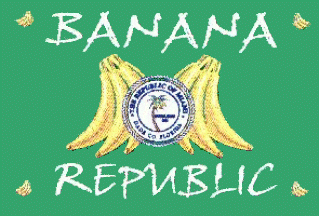
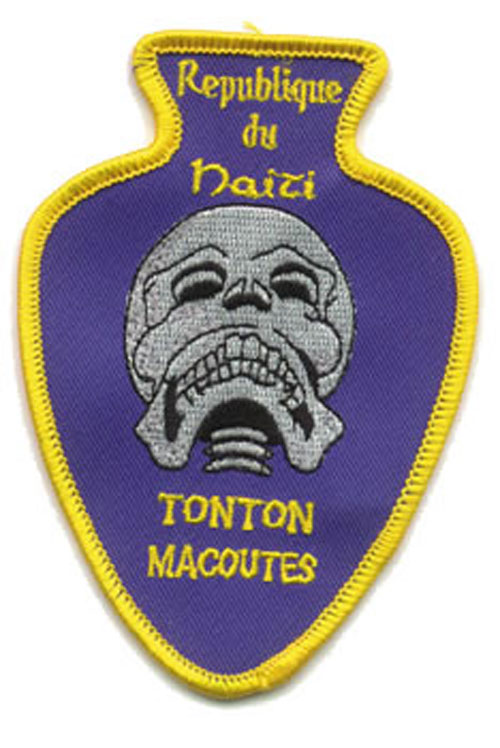
(Near the beginning, comment the Macoutes were trained by the US Marines. So damned sad, but no surprise to people who pay attention. )